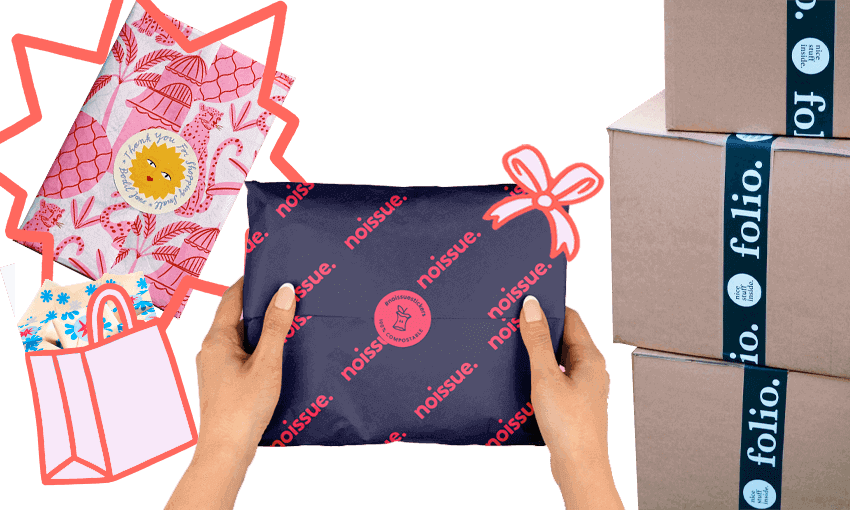Customisable, sustainable tissue paper, stamps and mailers are no issue for noissue, the global packaging solutions platform based in Tāmaki Makaurau. And it’s riding the pandemic-fuelled surge in the e-commerce sector.
Have you ever unwrapped a present with inexplicable care and attention, simply because the packaging was nicer than the gift itself? Sometimes, with the right feel and look, an unboxing can make any ordinary day feel like Christmas morning. And how about feeling justified that your luxurious and expensive skincare splurge has warranted its own jigsaw puzzle of cardboard inserts and bigger boxes, all tied up in a bow?
Josh Bowden and Augie Gruar, the founders of global packaging solutions platform noissue, can attest to the power of packaging. Founded in late 2016 and focused on small and medium-sized businesses, noissue’s origins lie in Bowden and Gruar’s earlier efforts to take on the global eyewear market with their own small business, high-end and eco-friendly eyewear brand Lewis Fredericks. They had searched for sustainable packaging only to come up empty, which prompted them to make their own. But when they showed the glasses to potential stockists, they fielded as many questions about the packaging as the product. They realised there was a gap in the market.
With 80,000 retailers and counting, noissue lets businesses design and customise a range of recycled, compostable or recyclable products in line with their own branding, order as many units as they need and receive their custom-made tissue paper, stamps or mailers in the post, ready for wrapping a customer’s online purchase. And customers are shopping online like never before – New Zealanders are buying a wider range of products and from more stores, all from the comfort of their computer or phone screens. Online spend in 2019 grew 13%; a year later, it rose by a quarter. Near the end of 2021, it was forecast to grow a further 20%.
Coinciding with this surge in e-commerce, noissue has experienced its best two years of year-on-year growth, says director of operations Tim Instone. “Across different industries, we’ve seen things like homeware and health and beauty really increase. People are working from home, and instead of spending money going out to a restaurant, they care a lot more about a linen duvet set or whatever it might be.”
Five years on, noissue has expanded from an initial team of four to being a global employer of 130 people and has the financial backing of London-based Felix Capital, a “venture capital firm for the creative class” that’s backed Peleton, Deliveroo and Gwyneth Paltrow’s Goop. Instone stays noissue hadn’t solicited the investment at all; the business had bootstrapped its growth until then and an Instagram direct message from Felix was how it broached the subject. I spoke with Instone about the global packaging platform’s path to success so far.
Is packaging the kind of business that is easy to scale?
The traditional model of packaging is very much about the quotation process, proofs, dielines, artwork charges, shipping, manufacturing – account management, essentially. We’ve managed to disrupt that and it comes down to the platform that’s allowed us to do that at scale. Creativity is one of our core values and customisation is important as well, so we started off with that hero product of ours, noissue tissue, and allowed people to not only design but order online. And then we go and make that a product and ship it directly to our customer. It’s a very scalable way of doing things.
How have you managed the process of expanding into new geographies?
We were global since day one. We sold to six markets – the US, Canada, UK, EU, New Zealand and Australia – from day one. [We had] a global mindset from the get-go. We’re a platform online so it’s quite easy to manage the front side of it. Probably growing a global team to support that kind of expansion is what we’ve worked through over the last five years. I was in Toronto from day one so a quarter of our team was already overseas and then we’ve grown our key hubs in London, LA, Auckland and Manila to support our global customer base. It was never really a thought for us that “we’re going to need to open the door in the UK” next. It was immediate for us.
What’s been easy and hard about chasing scale?
The easier part would be the product side. While launching a product is not easy, deciding which product to bring to market is easy because we literally ask our customer, after they order, what would they like to see from us next. [Something] more difficult? Scaling a business across five or six different markets, building a powerful platform online – that’s something you can’t really do overnight as it requires a lot of effort and input. We’re focused on growing a world-class team. I came onboard after spending a year at [mobile donation services company] Pushpay in Seattle. I got a call out of nowhere from Josh about a week before I was about to go to Toronto asking if I wanted to get amongst and I was like, “Hell yeah!” So going from there to here, I wouldn’t say it’s been difficult, but getting that scale and growth has come with a lot of problem-solving and a lot of taking it as it comes.



